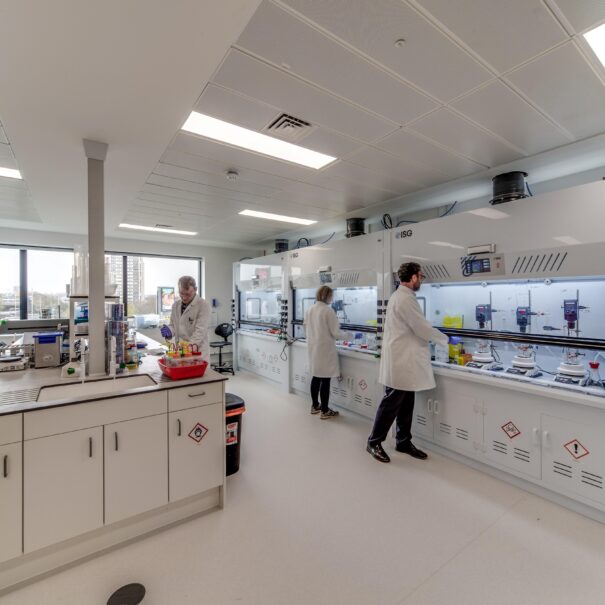
White City Innovation District: Defining London’s Life Sciences Future
To mark London Life Sciences Week (16th – 21st November 2025), we take a deep dive into White City Innovation District’s rising prominence as a strategically important life sciences hub. We explore some of defining features of this key West London base – home to start-ups, scale-ups and global powerhouses that are driving innovation and bringing game-changing advances to public health worldwide.
LONDON LIFE SCIENCES WEEK: CELEBRATING the CAPITAL’s IMPACT

London Life Sciences Week (LLSW) is held annually each November, co-organised by the UK BioIndustry Association (BIA), MedCity, and London & Partners, with support from the Mayor of London and the UK Government. Taking place across multiple venues in the capital, LLSW brings together global investors, biotech leaders, and innovators for a week of high-impact networking, dealmaking, and thought leadership. Its aim is to spotlight the UK’s life sciences sector, foster international partnerships, and boost London’s position as a premier destination for scaling biotech A ventures and advancing healthcare innovation.
Why London Is a Global Life Sciences Leader
London’s appeal as a life sciences hub is compelling, making it one of the most dynamic environments for translating science into real‑world innovation.
- Access to capital: The city attracts billions in venture and growth funding, with White City Innovation District drawing over £1.8bn in life sciences investment alone since 2017, and helping to create more than 2,700 local jobs.
- Clinical partnerships: Home to world-class hospitals and major NHS institutions, London offers unmatched clinical collaboration opportunities that are a major driver of success for life science innovators. Working directly with clinicians, researchers and patients, companies based in the capital are able to accelerate the translation of discoveries into game-changing therapies, diagnostics and technologies.
- Global talent: Hosting international league table-topping universities and a thriving tech scene, London is renowned for its ability to attract world-class scientists, engineers, and entrepreneurs.
Together, these unique strengths make London — and White City in particular — a powerful launchpad for life sciences companies aiming to scale breakthroughs that can improve lives worldwide.
Now, White City Innovation District is fast becoming recognised as a major destination for life sciences, with its thriving ecosystem of start-ups, scale-ups and established global leaders working across biotechnology, pharmaceutical, medtech and healthcare innovation.
From its earliest beginnings in 2017, the District has rapidly emerged as one of Europe’s most effective life science clusters. Anchored by Imperial College London and surrounded by world-class infrastructure, White City Innovation District offers a fertile ecosystem where science, technology, and entrepreneurship converge to tackle some of the world’s most pressing health challenges.
White City’s transformation into a life sciences powerhouse is no accident. It’s the result of strategic investment, a pathfinder vision, academic excellence, and a strong commitment to innovation.
THE POWER OF THE WHITE CITY ECOSYSTEM:
OUR DISTINCTIVE STRengths
- Powered by Imperial College London: One of the world’s top universities, Imperial provides unparalleled access to cutting-edge research, talent pipelines and nationally-unique facilities. Imperial’s White City Deep Tech Campus is proving a magnet for biotech, medtech and life sciences ventures.
- Community of Innovators: Hundreds of organisations call White City Innovation District home, from early-stage companies to established global leaders such as Novartis. Companies benefit from shared expertise and a collaborative culture that accelerates innovation.
- Academic–Industry Synergy: Early-stage start-ups work side-by-side with Imperial researchers, enabling rapid translation of discoveries into commercially viable solutions.
- Clinical Access: Nearby Hammersmith Hospital, part of Imperial College Healthcare NHS Trust, offers direct pathways for clinical trials and translational medicine.
- Purpose-built infrastructure: From Scale Space, White City Place and the Translation & Innovation Hub (I-HUB) to Imperial Incubator, companies benefit from flexible lab space, accelerator facilities and shared resources designed to support scientific advances and rapid growth.
- Strategic location: White City Innovation District is the closest major business district to Heathrow Airport, with fast links to central London and future HS2 connectivity via Old Oak Common — ideal for global collaboration and expansion.
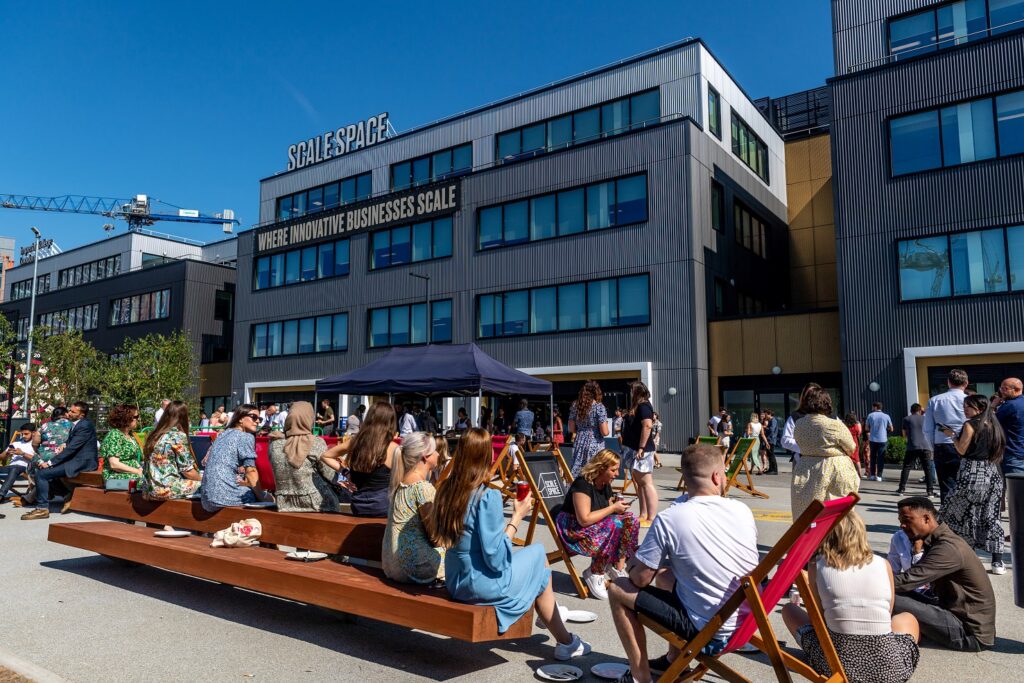
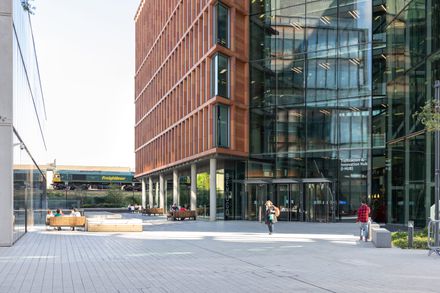
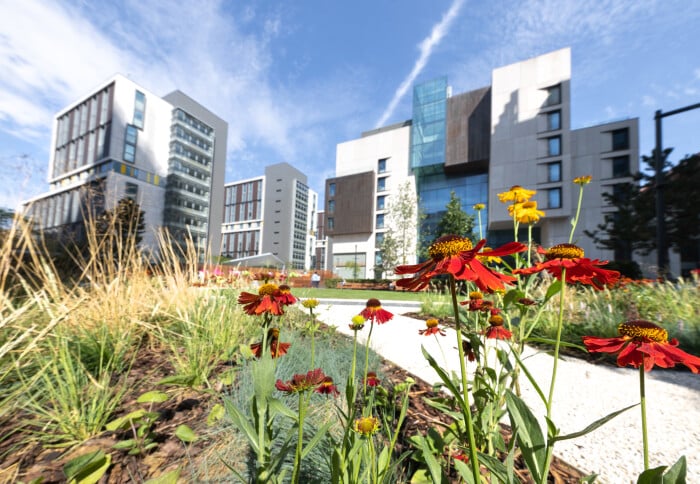
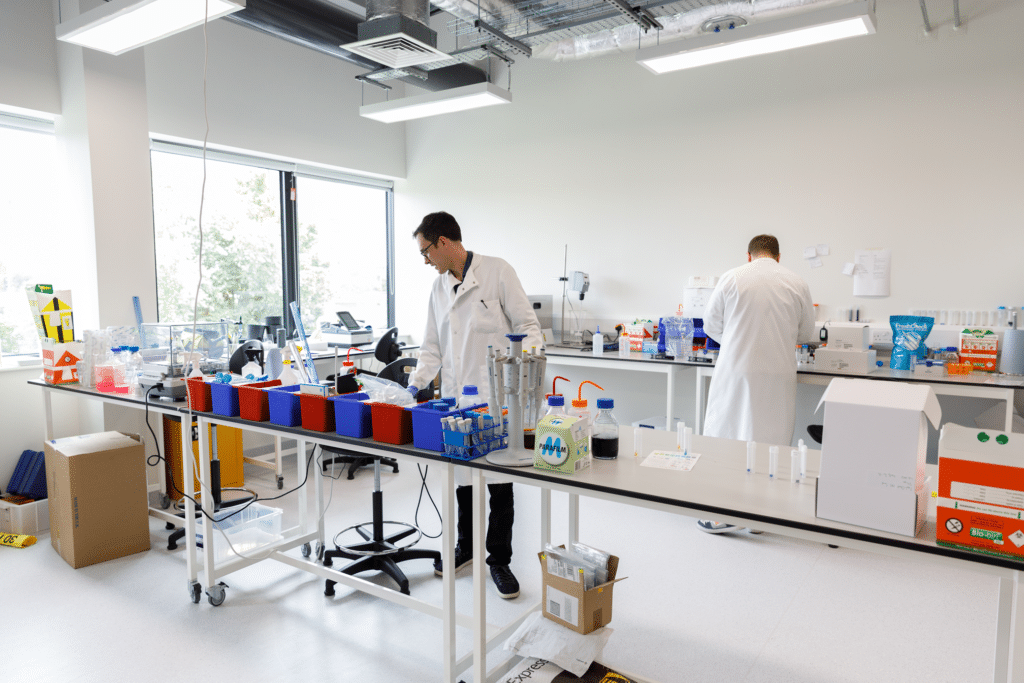
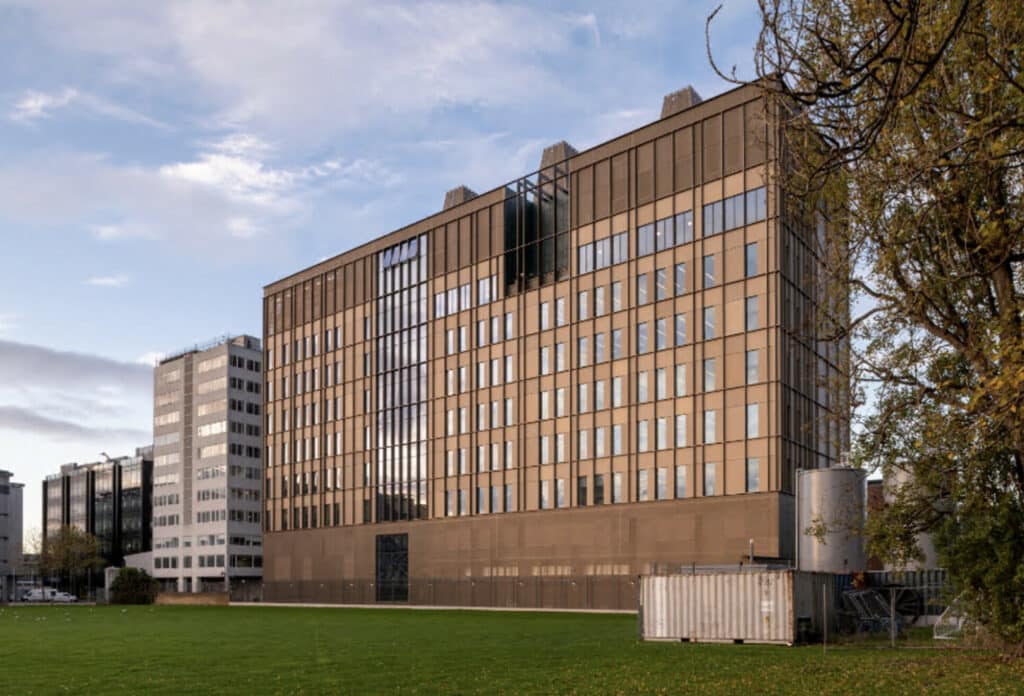
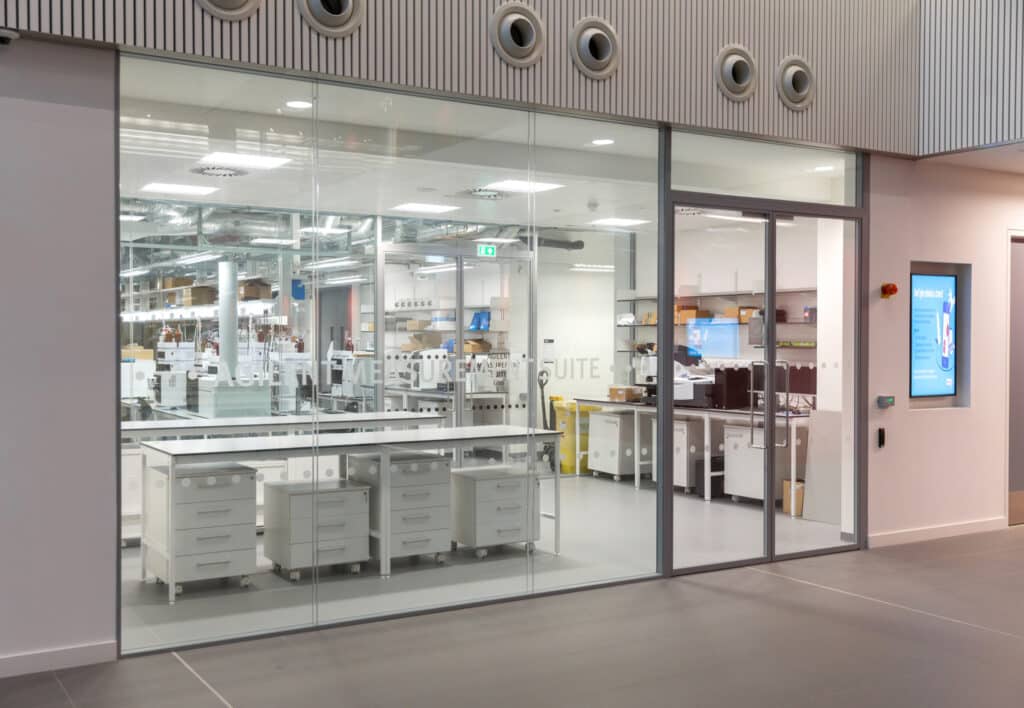
Pictured clockwise L–R:
1. Scale Space is a purpose‑built innovation hub in White City Innovation District, offering 200,000 sq ft of flexible lab and office space designed to help start-ups and scale‑ups grow.
2. I‑HUB (Translation & Innovation Hub) at Imperial College London’s White City Campus is a purpose‑built facility designed to accelerate science‑led ventures – offering bespoke laboratories, flexible workspaces, and direct access to Imperial’s academic and enterprise networks.
3. Imperial’s White City Campus is a major hub for innovation, entrepreneurship, and multidisciplinary research. It brings together scientists, engineers, clinicians, businesses, and local communities to turn groundbreaking science into real‑world impact.
4. Imperial Incubator White City is a world‑class facility at the heart of White City Innovation District, designed to support early‑stage deep science and technology start-ups with flexible lab space, offices, and business support.
5. The MRC Laboratory of Medical Sciences (LMS) is a leading biomedical research institute embedded within White City Campus and Hammersmith Hospital, dedicated to understanding the molecular and cellular basis of human disease. Its research has driven advances in epigenetics, genes and metabolism, and quantitative biology — all areas underpinning major breakthroughs in our understanding of disease, ageing and health.
6. The Agilent Measurement Suite (AMS) is a flagship laboratory that provides state‑of‑the‑art analytical and measurement science capabilities, supporting research across chemistry, biology, medicine, and environmental science.
In March 2024, Imperial College London opened a new School of Public Health in White City Innovation District – a landmark facility dedicated to tackling global health challenges through cutting‑edge research, teaching and community engagement.
The school sits at the heart of WestTech London, which is anchored by Imperial’s major science and innovation locations across West London in South Kensington-Albertopolis, Paddington Life Sciences, White City Innovation District and Old Oak and Park Royal. The new school is within easy reach of the Invention Rooms, where Imperial engages with local communities – including bringing its global expertise to bear on London health challenges – and is a stone’s throw from valuable clinical research settings at Imperial College Healthcare NHS Trust and Imperial’s Hammersmith Campus, where last year The Princess Royal opened the £120 million state-of-the-art MRC Laboratory of Medical Sciences (LMS).

In focus: RISING LIFE SCIENCES STARS
An impressive 15 White City Innovation District companies are highlighted in MedCity’s new ‘London Life Sciences Companies to Watch 2025’ report, published to coincide with London Life Sciences Week. MedCity’s new analysis provides an authoritative snapshot of the emerging stars across biotech, medtech, healthtech and beyond, reflecting the energy, talent and transformative potential of London’s life sciences sector.

The report highlights over 60 pioneering companies driving breakthroughs in gene therapy, AI diagnostics, precision medicine and more — and White City Innovation District is proudly at the heart of it. White City Innovation District and WestTech London ecosystem companies recognised include:
- Vivan Therapeutics develops personalised cancer therapeutics by combining fruit fly disease models, machine learning, and drug screening to identify effective treatments.
- 30 Technology advances nitric oxide‑generating technologies that are being applied to respiratory disease, rare conditions, oral health, and ophthalmology.
- Autolus Therapeutics is a clinical‑stage biopharmaceutical company creating next‑generation CAR‑T cell therapies to treat cancer and autoimmune diseases.
- Avacta Therapeutics innovates novel cancer immunotherapies and diagnostics using its proprietary Affimer® and pre|CISION™ platforms.
- Epsilogen pioneers pan‑isotype antibody therapeutics and is developing the world’s first clinical IgE antibody for solid tumours.
- DNAe is an Imperial College spin‑out that develops semiconductor sequencing technology for rapid, point‑of‑care genomic diagnostics.
- MediSieve creates magnetic blood filtration devices designed to remove pathogens, toxins, and harmful cells directly from the bloodstream.
- Micrographia Bio is an AI‑driven biotech company that uses spatial proteomics and advanced imaging to accelerate drug discovery.
- MiNA Therapeutics is the world leader in RNA activation (RNAa), developing drugs that turn on genes to treat disease.
- Mitra Bio builds non‑invasive skin epigenetics testing platforms that replace biopsies and advance longevity research.
- Mytos automates human cell culture manufacturing with its iDEM™ technology, enabling the scalable production of regenerative medicine.
- Orchard Therapeutics is a global leader in ex vivo autologous gene therapies for rare inherited diseases such as ADA‑SCID and MLD.
- P.Happi® is a female‑led biotech developing microbiome‑based intimate health products, including a daily serum to prevent UTIs and thrush.
- Portal Biotech builds single‑molecule protein sequencing platforms that aim to transform proteomics, drug discovery, and diagnostics.
- Quell Therapeutics develops engineered T‑regulatory (Treg) cell therapies to treat autoimmune and inflammatory diseases.
JOIN OUR ExCEPTIONAL COMmUNITY
Founders, investors, and researchers who are ready to shape the future of health innovation will find their home at the White City Innovation District, where science meets scale. Reach out today to discover how you can become part of it.
DIRECTORY: OUR LIFE SCIENCES INNOVATORS
Life sciences companies based in White City Innovation District range from early‑stage biotech and medtech start-ups to scale‑ups and global R&D teams, working on innovations in oncology, cell and gene therapies, synthetic biology and diagnostics. Many are spin-outs from Imperial College London, while others are fast‑growing ventures backed by significant investment — together attracting over £1.8bn into the sector. This mix of size and focus creates a highly dynamic ecosystem where cutting‑edge science is translated into real‑world impact.
Explore our Life Sciences Community here.
